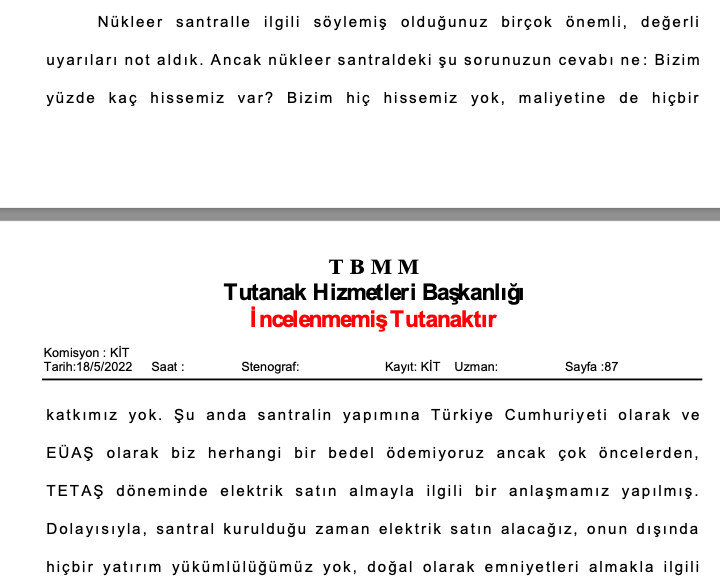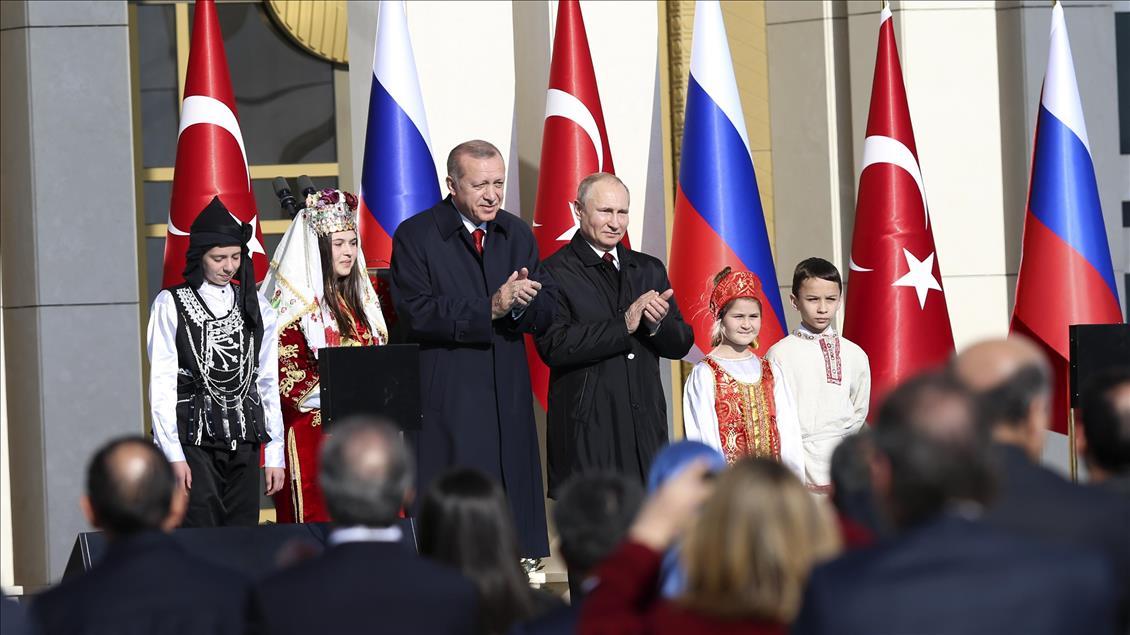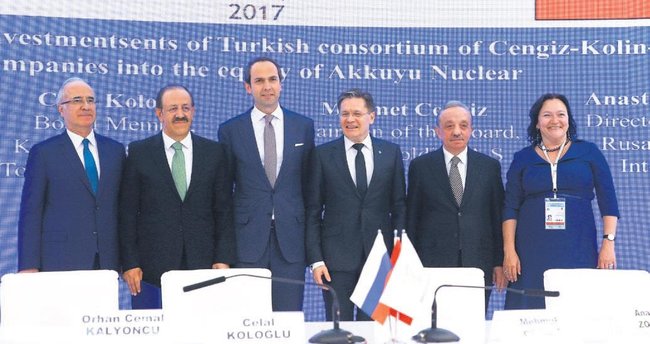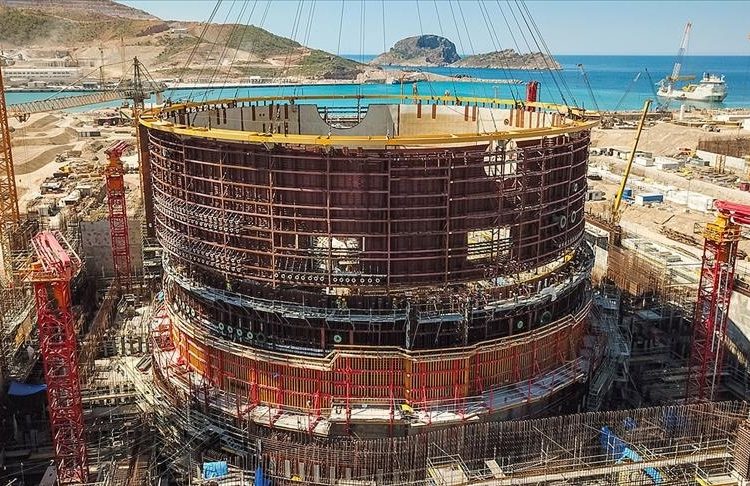Levent Kenez/Stockholm
Turkey will not be a shareholder in the Akkuyu nuclear power plant currently under construction by Russia in Mersin on the Mediterranean coast of southern Turkey, Nordic Monitor has learned.
İzzet Alagöz, general manager of the Electricity Generation Corporation (EÜAŞ), the public institution that was believed be a shareholder in the facility, told lawmakers that being a partner in the $20 billion nuclear power plant is not on their agenda, during a committee meeting in the Turkish Parliament on May 18.
“We do not own any shares, and we do not contribute anything to the cost. Currently, we, as the Republic of Turkey and as EÜAŞ, are not paying anything for the construction of the power plant. We have no obligation other than the compulsory purchase of electricity according to the bilateral agreement. Whether or not to buy a certain percentage of its shares is not on our agenda,” Alagöz added.

As opposition deputies expressed in the committee meeting, It is widely believed by the Turkish public that the nuclear facility was built jointly with Russia and that both countries have equal shares. However, Russia’s Atomstroyexport, a subsidiary of the Rosatom State Nuclear Energy Corporation, currently owns all shares. The agreement between Turkey and Russia stipulates that the Russian stake cannot fall below 51 percent.

According to previous reports in the Turkish media, Rosatom was in talks with four Turkish companies. It was rumored that Rosatom especially wanted state company EÜAŞ to be a partner in the project. However, the acquisition of 49 percent of the shares would entail a large investment of $10 billion for EÜAŞ at a time when Turkey has a foreign exchange shortage due to the excessive depreciation of the lira against the dollar.
It was announced in 2017 that a consortium consisting of the Cengiz, Kolin and Kalyon holdings, which are owned by the businessmen in the inner circle of Turkish President Recep Tayyip Erdoğan, would become a 49 percent shareholder in the project. However, it appeared that the consortium could not agree on commercial matters with the Russians. In 2018 Kolin and Kalyon announced that they had withdrawn from partnership negotiations.
During Erdoğan’s visit to Russia in 2019, Turkish media reported that a joint energy fund that would finance Akkuyu was negotiated and that the Turkish Wealth Fund headed by Erdoğan would represent the Turkish side. The plan, however, never materialized.
Experts claim that plant construction is progressing slowly, making it hard to believe that the first phase will be finished in 2023 as previously announced. It was anticipated that the financing provided by the new partner would speed things up.
The facility is a flagship project of the government originally planned for completion before the general election in 2023, which is also the 100th anniversary of the Turkish Republic.

In 2021 Erdoğan inspected the construction of the nuclear facility and stated that electricity production would begin in May 2023.
According to an Al Jazeera report dated May 16, unprecedented sanctions against Russia over its invasion of Ukraine have led to fresh concerns about Turkey’s first nuclear power plant. Potential blocks on financing and equipment from third countries have threatened to delay the $20 billion project.
According to Turkey’s agreement with Russia, Turkey commits to purchasing electricity from the plant for 15 years. Experts claim that there was a mistake in determining the price of the electricity and that the government promised to pay the Russians an exorbitant price.
Main opposition leader Kemal Kılıçdaroğlu said in February that the most serious risk facing Turkey in the energy sector is the expensive Akkuyu electricity.
Recalling that the electricity to be produced at Akkuyu costs $12.35 per kilowatt-hour excluding VAT, Kılıçdaroğlu said that “the world average is close to one-third of this. When the Akkuyu nuclear power plant starts operations, businesses will use three times more expensive electricity.”
The opposition also says because Turkey is dependent on Russian gas, awarding Russia a strategic facility creates a serious national security problem. However, the government claims that the Russians were preferred because they submitted the best offer.
The foreign policy effects of Turkey’s dependence on Russia for energy were also admitted by Erdoğan.
Stating that Turkey relies only on UN resolutions for sanctions against Russia, Erdoğan said on the way back from the NATO summit in Brussels in March that it is not possible for them to set aside relations with Russia. “When natural gas alone is considered, we buy about half of it from Russia today. Besides, we are building the Akkuyu nuclear power plant with Russia. We can’t set that aside, either. When I said this to [French President Emmanuel] Macron today, he said, ‘You’re right,” Erdoğan told the journalists.
On March 5 the Turkish Parliament approved a government-endorsed bill on a nuclear regulatory framework that authorized a number of concessions to Atomstroyexport.
The bill was submitted to parliament on February 24 by the government and was fast tracked through two parliamentary committees in four days. The general assembly voted to approve it on Saturday amid a barrage of criticism from the opposition parties.
The agreement to build a 4,500-MW capacity nuclear power plant was signed between Turkey and Russia in 2010, with construction scheduled to begin in 2013. When it becomes fully operational, it will provide 10 percent of Turkey’s electricity requirements.
Minutes of parliamentary committee meeting:












